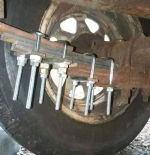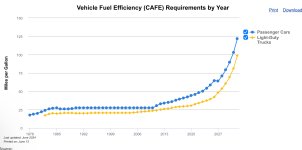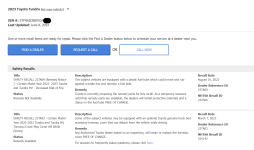You are using an out of date browser. It may not display this or other websites correctly.
You should upgrade or use an alternative browser.
You should upgrade or use an alternative browser.
3rd Gen Engine Failures
- Thread starter Mattedfred
- Start date
Thanks! I probably should have made it its own video. It’s currently blowing up anyway with regards to views. So it works.Just watched Tim’s update video with info from nhtsa site on how Toyota investigated and made their recall decision. Great info. Go check it out if you haven’t already.
My 1/18/2023 build date tundra doesn't come up on any Toyota or non-Toyota website as being involved in the recall. Typically my Toyota app dings it within 1 day of the announcement for the other recalls.
The best I could do by poking in random vins I could find of trucks built between Jan 1st 2023 and Feb 10th 2023, is that perhaps some of them were built with new process engines because I found random hits and misses with recall affected trucks in that date range. Any truck built Dec 2022 or earlier I was not able to find a miss on the recall.
The only preventative thing I did when I first heard of these things last year was I changed my oil at 1000 Miles. I opened the filter and saw zero debris nor any rtv specs, the filter was spotless.
The best I could do by poking in random vins I could find of trucks built between Jan 1st 2023 and Feb 10th 2023, is that perhaps some of them were built with new process engines because I found random hits and misses with recall affected trucks in that date range. Any truck built Dec 2022 or earlier I was not able to find a miss on the recall.
The only preventative thing I did when I first heard of these things last year was I changed my oil at 1000 Miles. I opened the filter and saw zero debris nor any rtv specs, the filter was spotless.
that's weird. It should according to Toyota being one of the recalls as far as I know.My 1/18/2023 build date tundra doesn't come up on any Toyota or non-Toyota website as being involved in the recall. Typically my Toyota app dings it within 1 day of the announcement for the other recalls.
The best I could do by poking in random vins I could find of trucks built between Jan 1st 2023 and Feb 10th 2023, is that perhaps some of them were built with new process engines because I found random hits and misses with recall affected trucks in that date range. Any truck built Dec 2022 or earlier I was not able to find a miss on the recall.
The only preventative thing I did when I first heard of these things last year was I changed my oil at 1000 Miles. I opened the filter and saw zero debris nor any rtv specs, the filter was spotless.

I wouldn’t be surprised if Toyota offered a voluntary buyback of all the trucks when it’s all said and done. I just looked at their financials, and they could afford to. It would be a huge hit, but they could swing it. A buyback might also be the best thing for them in the long run for their reputation. Since there’s a decent chance this could get turned into a class action suit, they might just do it to avoid the lawsuits and also save their reputation at the same time. It would be a complicated mess, but I am sure they are weighing the option.
I guess we’ll see when Toyota finally announces the remedy.
Hilux
Well-known member
If Toyota was smart they would just bite the bullet and install complete dressed engines that way the dealer could just pull the cab off remove the old engine and install the new dressed engine to the trans and transfer case and be done with it, expensive as hell, yes, but also faster.
I wouldn’t be surprised if Toyota offered a voluntary buyback of all the trucks when it’s all said and done. I just looked at their financials, and they could afford to. It would be a huge hit, but they could swing it. A buyback might also be the best thing for them in the long run for their reputation. Since there’s a decent chance this could get turned into a class action suit, they might just do it to avoid the lawsuits and also save their reputation at the same time. It would be a complicated mess, but I am sure they are weighing the option.
I guess we’ll see when Toyota finally announces the remedy.
I don't think they've figured out for sure if the metal debris was the problem. Long blocks are easier to install, but not a better solution if they don't have them.If Toyota was smart they would just bite the bullet and install complete dressed engines that way the dealer could just pull the cab off remove the old engine and install the new dressed engine to the trans and transfer case and be done with it, expensive as hell, yes, but also faster.
Tundradude34 just made a video talking about what people commenting on his videos think the remedy should be for the recalled engines. Seems like most people want a V8 option. I know that isn't possible and I don't think folks realize that the V8 is being regulated out of existence by CAFE and emissions standards set by the government. One thing most people agree on is that a short block replacement doesn't seem like a good idea and don't want it. To me, a short block swap feels like a risky fix and the owner is taking all the risk. Kinda like this picture makes me feel:


Hilux
Well-known member
Its like p!ss!ng into the wind i doubt Toyota even listens to its customers at this point.Tundradude34 just made a video talking about what people commenting on his videos think the remedy should be for the recalled engines. Seems like most people want a V8 option. I know that isn't possible and I don't think folks realize that the V8 is being regulated out of existence by CAFE and emissions standards set by the government. One thing most people agree on is that a short block replacement doesn't seem like a good idea and don't want it. To me, a short block swap feels like a risky fix and the owner is taking all the risk. Kinda like this picture makes me feel:
View attachment 513
I hope he does a teardown. That would be great if he had one right about now. Also, the CAFE standards keep getting worse and worse. Look at how much recent administrations have increased them in this graph. Auto makers are facing an uphill battle trying to do what the government mandates vs what customers want.I hope that the guy who has a YT CHANNEL called “I Do Cars” would get ahold of one of these engines and go through his thorough disassembly to find out what is actually happening inside the engine. He has torn apart engines from a whole variety of manufacturers that have failed in one way or another. BTW, the CAFE standards were introduced in 1975 under President Ford.

What's really bad about how CAFE is used now is the right hand side of that graph. They were basically flat for 20 years. Now the govt wants the average mpg to be almost 100 mpg for light trucks and over 120 mpg for cars by 2032. It's a backhanded way to force and EV mandate. Rather than develop and engineer a plan on how to get there with electric cars and grid upgrades, they just regulate ICE engines out of existence and drive prices through the roof. These small displacement turbo engines won't be around very long either with the mandates looking like they currently do.I lived through the Arab oil embargo where there were long lines for gas and it was expensive. Unfortunately I had to get rid of my ‘69 Chevelle because I couldn’t afford gas. Part of the government’s response was the CAFE standards to try to encourage the vehicle manufacturers to make cars more efficient and that continues today but I am pretty sure you already know this history.
Another thing to keep in mind is automakers are part of the process for setting CAFE standards and many of the brands have taken a pledge to reduce emissions themselves. That's why when Trump tried to rewrite the CAFE laws, the automakers ignored them. They were already above and beyond those rules in terms of meeting emissions and fuel economy goals. And they were pushing for even more reductions.
IMO - It is a weird marketplace right now with automakers deciding what customers want and not the other way around. Some brands, like GM, are pulling back from their full EV pledges and starting to consider hybrids and PHEVs as more important. I swear somedays I just sit back and munch on some popcorn waiting to see how things turn out.
IMO - It is a weird marketplace right now with automakers deciding what customers want and not the other way around. Some brands, like GM, are pulling back from their full EV pledges and starting to consider hybrids and PHEVs as more important. I swear somedays I just sit back and munch on some popcorn waiting to see how things turn out.
Another note on the trade-ins video. I'm seeing some pushback from people saying it isn't true. I find that odd. Why would Toyota fans be calling out other Toyota owners? That's what they are doing. They are saying, the article is clickbait and it isn't happening IRL. Yeah, some guy said, "is anyone seeing this IRL?" C'mon man. That's absurd. Where did the quotes come from? I didn't make them up.
One of the big Facebook groups has posts saying the post is clickbait followed by another post with a screenshot showing a dealer saying no to the trade-in. There are some dealers who are willing to take it in to wholesale it, but the prices are low. Frankly, I still consider that a no on a trade-in. Why would you trade it in for the dealer to wholesale? Doesn't make any sense to me.
I get brand loyalty is a big part of the pushback. I just find it bizarre Toyota owners are blasting other Toyota owners who are trying to trade-in their truck.
One of the big Facebook groups has posts saying the post is clickbait followed by another post with a screenshot showing a dealer saying no to the trade-in. There are some dealers who are willing to take it in to wholesale it, but the prices are low. Frankly, I still consider that a no on a trade-in. Why would you trade it in for the dealer to wholesale? Doesn't make any sense to me.
I get brand loyalty is a big part of the pushback. I just find it bizarre Toyota owners are blasting other Toyota owners who are trying to trade-in their truck.
I remember those discussions now. On the financial networks at the time, there was also a lot of discussion about Blackrock, Vanguard, etc trying to influence the decisions. These funds hold so much sway with companies, and also dictate the board members, that sometimes decisions aren’t in the best interest of the company or the shareholders. It’s kind of like the push for fake meat. Nobody wants that crap, but it’s part of the climate agenda so certain politically motivated people push it.
As an aside, if you suddenly notice a large company doing strange things and making wacky decisions, check into the board members and what funds are major shareholders. You will start to notice a trend.
As an aside, if you suddenly notice a large company doing strange things and making wacky decisions, check into the board members and what funds are major shareholders. You will start to notice a trend.
Last edited:
Well, wonder if the online quoters have caught on? Start entering Tundra data into Carmax, Driveway, Carvana, etc. to see if they will give you a trade-in price or not.Another note on the trade-ins video. I'm seeing some pushback from people saying it isn't true. I find that odd. Why would Toyota fans be calling out other Toyota owners? That's what they are doing. They are saying, the article is clickbait and it isn't happening IRL. Yeah, some guy said, "is anyone seeing this IRL?" C'mon man. That's absurd. Where did the quotes come from? I didn't make them up.
One of the big Facebook groups has posts saying the post is clickbait followed by another post with a screenshot showing a dealer saying no to the trade-in. There are some dealers who are willing to take it in to wholesale it, but the prices are low. Frankly, I still consider that a no on a trade-in. Why would you trade it in for the dealer to wholesale? Doesn't make any sense to me.
I get brand loyalty is a big part of the pushback. I just find it bizarre Toyota owners are blasting other Toyota owners who are trying to trade-in their truck.
Hilux
Well-known member
You should enter the VIN of the Tundra you had a year or two ago into Carmax or Carvana and so on to see if they would buy it? just out of curiosity.Another note on the trade-ins video. I'm seeing some pushback from people saying it isn't true. I find that odd. Why would Toyota fans be calling out other Toyota owners? That's what they are doing. They are saying, the article is clickbait and it isn't happening IRL. Yeah, some guy said, "is anyone seeing this IRL?" C'mon man. That's absurd. Where did the quotes come from? I didn't make them up.
One of the big Facebook groups has posts saying the post is clickbait followed by another post with a screenshot showing a dealer saying no to the trade-in. There are some dealers who are willing to take it in to wholesale it, but the prices are low. Frankly, I still consider that a no on a trade-in. Why would you trade it in for the dealer to wholesale? Doesn't make any sense to me.
I get brand loyalty is a big part of the pushback. I just find it bizarre Toyota owners are blasting other Toyota owners who are trying to trade-in their truck.
chaseydog
Well-known member
I'm guessing that many of these powertrains are part of global platforms. CAFE is part of the equation but so is meeting emission and milage requirements in other markets.Another thing to keep in mind is automakers are part of the process for setting CAFE standards and many of the brands have taken a pledge to reduce emissions
Fightnfire
Moderator
Another note on the trade-ins video. I'm seeing some pushback from people saying it isn't true. I find that odd. Why would Toyota fans be calling out other Toyota owners? That's what they are doing. They are saying, the article is clickbait and it isn't happening IRL. Yeah, some guy said, "is anyone seeing this IRL?" C'mon man. That's absurd. Where did the quotes come from? I didn't make them up.
One of the big Facebook groups has posts saying the post is clickbait followed by another post with a screenshot showing a dealer saying no to the trade-in. There are some dealers who are willing to take it in to wholesale it, but the prices are low. Frankly, I still consider that a no on a trade-in. Why would you trade it in for the dealer to wholesale? Doesn't make any sense to me.
I get brand loyalty is a big part of the pushback. I just find it bizarre Toyota owners are blasting other Toyota owners who are trying to trade-in their truck.
If you find that weird you haven't spent enough time on Toyota forums Tim lol I've said it a dozen times it's one of the most aggressive owner groups in defending Toyota reliability that I've come across in ownership forums.

